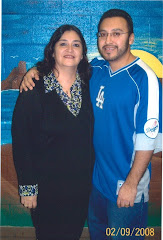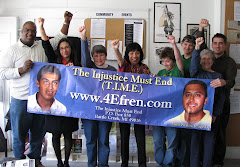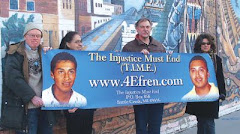The following is a list of links to information about the campaign to free Efrén Paredes, Jr. and abolish juvenile life without parole (JLWOP) sentences in the USA. You can share this list with others by directing them to the following link: http://tinyurl.com/EPJ360.
Efrén Paredes, Jr. Links
Web Site: www.4Efren.com
Efrén Blog: http://4Efren.blogspot.com
Facebook Page: http://tinyurl.com/8bpm7v
MySpace Page: www.myspace.com/4Efren
Petition: www.petitionspot.com/petitions/4Efren
Campaign Blog: http://Free-Efren.blogspot.com
Twitter: http://twitter.com/free_efren
Document Sharing Page: http://tinyurl.com/7nq4tf
Download Free Efrén Poster: http://tinyurl.com/77vbyf
Efrén Paredes, Jr. Group Links
Fairness for Efrén MySpace Group: http://groups.myspace.com/4Efren
Fairness for Efrén Facebook Group: http://tinyurl.com/8ms2qz
Contact the Governor to Support Efrén's Release
Contact Governor: http://tinyurl.com/55hu83
Juvenile Life Without Parole Links
Abolish JLWOP Blog: http://Abolish-JLWOP.blogspot.com
Abolish JLWOP Petition: www.petitionspot.com/petitions/jlwop
Juvenile Life Without Parole Group Links
Abolish JLWOP Google Group: http://tinyurl.com/7lyduw
Abolish JLWOP MySpace Group: http://groups.myspace.com/JLWOP
Abolish JLWOP Facebook Group: http://tinyurl.com/9qcgpg
Sunday, December 28, 2008
Monday, December 22, 2008
Melissa Osborn Discusses Efrén's Public Hearing on Ebling and You (WILS 1320 AM)
 Jack Ebling, WILS 1320 AM Lansing radio show host, interviewed Melissa Osborn, Co-Chair of the Peace Education Center, this evening, Monday, December 22, 2008.
Jack Ebling, WILS 1320 AM Lansing radio show host, interviewed Melissa Osborn, Co-Chair of the Peace Education Center, this evening, Monday, December 22, 2008.Jack and Melissa discuss Efrén's December 4, 2008 public hearing during a large segment of the interview. Melissa offers her perspective about how the hearing went as someone who was present the entire time, highlights noteworthy points during the hearing, and shares conversation she and other members of the Lansing TIME Committee had with Efrén subsequent to the hearing.
Click the play button on the left side of the flash player below to listen to the interview.
Thursday, December 18, 2008
Michigan Governor Asked to Free Man Convicted of Murder at 15
 by David Eggert, Associated Press Writer
by David Eggert, Associated Press WriterBlackman Township, Mich. December 18, 2008 (AP)
Efren Paredes Jr. wasn't old enough to drive when he was sentenced to life in prison without parole for murdering his boss.
Now 35, he has an outside chance at freedom after proclaiming his innocence for almost two decades.
The possibility is a nightmare for the victim's family, who thought his killer would die behind bars. But it means hope for Paredes and supporters who say he was wrongfully convicted because of a rush to judgment, an unfair trial and slanted media coverage.
The decision rests with Gov. Jennifer Granholm, who under the state constitution can commute criminal sentences. She likely will give weight to whatever recommendation comes from the Michigan Parole Board, which recently held an emotional, nine-hour public hearing on Paredes' clemency request.
"I will not take responsibility for a crime I did not commit," Paredes told parole board members. "I never will do that even if it meant I could leave today."
Grocery store manager Rick Tetzlaff, 28, was shot to death March 8, 1989, during a robbery at Roger's Foodland in St. Joseph, in southwestern Michigan. Paredes was a 15-year-old part-time bagger at the store who had no criminal record before his arrest.
The hearing before the parole board drew more than 140 people. Somber police and prosecutors who worked the case, along with Tetzlaff's tearful family and friends, traveled hours to testify against Paredes' release.
A large group of supporters came out for Paredes, including family, a Lansing radio host, Michigan State University Latino students, peace activists and a private investigator who has helped free innocent people from prison.
While commutation proceedings have become more common in the governor's second term, few; if any; have gained as much attention.
More than just about Paredes' guilt of innocence, the case has become a referendum of sorts on whether convicts should get mandatory life sentences without parole for crimes committed before age 18. Paredes is among more than 300 juvenile lifers in Michigan's 49,000-inmate system.
Advocates see Paredes as an inspirational figure who made the best of prison by earning a GED, becoming a teacher's aide, writing poetry and transcribing textbooks into Braille. Paredes wants to start a Braille transcription business if he is freed.
"Please don't sacrifice this man's future to cover up the mistakes of the justice system," said Joyce Gouwens, who has served on a county juvenile justice task force.
Opponents see Paredes as a cold-blooded monster with a comfortable upbringing who would be a threat to society.
"I'm angry I have to be here," said Tina Tetzlaff, Rick's wife, who was pregnant with their second child when her husband was killed.
She acknowledged Paredes is making strides in prison but told the parole board her two sons grew up without their dad, afraid of the world and in need of psychological treatment. She said Paredes should serve his full sentence.
Prosecutors argued that mandatory life without parole for first-degree murder is Michigan's promise to victims' families, a trade-off for not having the death penalty.
Chairwoman Barbara Sampson said the parole board has no authority to exonerate Paredes. Instead, it will address questions typical in parole and clemency cases: Does the punishment fit the crime? Does a prisoner pose a risk to society? Has he or she made progress in prison?
Board members usually want to see remorse. But Paredes has repeatedly said he's innocent, leading an assistant attorney general and board members to spend much of the hearing probing evidence.
They heard competing versions of Tetzlaff's death.
Prosecutors said Paredes planned and executed a "thrill kill." He was the last worker to punch out before the after-hours shooting. A teen who served time for his role in the crime told jurors he picked up Paredes from the store after Paredes shot his boss and took $11,000 in cash and checks.
But Paredes' mother said he was home at the time of the murder, insisting she saw Tetzlaff drop off her son before returning to the store. Supporters said those responsible for the crime lied, cut deals and blamed Paredes to save themselves.
Paul Ciolino, a Chicago-based private investigator who was hired by Paredes' family and has helped free five men from Illinois' death row, called his case a "classic" wrongful conviction.
 The trial ended 3 1/2 months after Paredes' arrest. Paredes said he had an inept lawyer who didn't investigate on his behalf or counter negative pretrial publicity coming from law enforcement.
The trial ended 3 1/2 months after Paredes' arrest. Paredes said he had an inept lawyer who didn't investigate on his behalf or counter negative pretrial publicity coming from law enforcement.The jury foreman was a co-worker of the victim's wife's aunt. Paredes alleged the foreman persuaded other jurors who initially voted 9-3 for acquittal. State and federal courts have upheld the conviction.
Paredes' backers want age to be a factor in the governor's decision. He was 16 when he was convicted.
"I could have turned out to be the person others have tried to make me out to be," Paredes said. "I'm asking for a second chance to reclaim my life."
Source: http://abcnews.go.com/US/WireStory?id=6486167&page=1
Monday, December 15, 2008
Juveniles Incarcerated for Natural Life Within Adult Prisons: Public Opinion in Michigan
Michigan is one of 19 states that allow children of any age to be tried and punished as adults. Trying youth as adults opened the door to imposing sentences of life without the possibility of parole, particularly in Michigan and 26 other states that have mandatory sentencing.
More than 300 youths have been sentenced to life without parole (LWOP) in Michigan and are serving these sentences in adult facilities. Michigan ranks third in the number of youth sentenced to LWOP and is second only to Louisiana in the rate of juveniles age 14-18 serving sentences of LWOP.
To determine public opinion on the issue, questions related to the topic were included in an annual statewide survey of those 18 years or older. The survey, administered by a public university, was conducted during the spring and summer of 2005.
We found that only 5 percent of residents supported Michigan’s current law regarding juveniles serving life without parole in adult facilities. The majority believed “blended” sentences that included both juvenile and adult sanctions were more acceptable. Moreover, Michigan citizens were strongly opposed to juveniles 16 and younger being housed with adults in correctional facilities and believed that juveniles were strong candidates for rehabilitation.
Michigan residents are unequivocal in their belief that youths should be held accountable for their violent crimes, but that it should be in a manner that recognizes the physiologic, psychological and emotional capabilities of the youths, understanding that these capabilities differ from that of adults. These findings support alternative sentencing arrangements and changes to Michigan’s current policies and legislation.
The above abstract is from the study conducted by Wayne State University School of Social Work. Click here to view the entire study and press release.
More than 300 youths have been sentenced to life without parole (LWOP) in Michigan and are serving these sentences in adult facilities. Michigan ranks third in the number of youth sentenced to LWOP and is second only to Louisiana in the rate of juveniles age 14-18 serving sentences of LWOP.
To determine public opinion on the issue, questions related to the topic were included in an annual statewide survey of those 18 years or older. The survey, administered by a public university, was conducted during the spring and summer of 2005.
We found that only 5 percent of residents supported Michigan’s current law regarding juveniles serving life without parole in adult facilities. The majority believed “blended” sentences that included both juvenile and adult sanctions were more acceptable. Moreover, Michigan citizens were strongly opposed to juveniles 16 and younger being housed with adults in correctional facilities and believed that juveniles were strong candidates for rehabilitation.
Michigan residents are unequivocal in their belief that youths should be held accountable for their violent crimes, but that it should be in a manner that recognizes the physiologic, psychological and emotional capabilities of the youths, understanding that these capabilities differ from that of adults. These findings support alternative sentencing arrangements and changes to Michigan’s current policies and legislation.
The above abstract is from the study conducted by Wayne State University School of Social Work. Click here to view the entire study and press release.
Thursday, December 11, 2008
Detroit Free Press staff writer, Jeff Gerritt, and Efrén Paredes, Jr. Appear on Ebling and You Radio Show Today (WILS 1320 AM)
 Jack Ebling interviewed Jeff Gerritt, Detroit Free Press staff writer, and Efrén Paredes, Jr. on WILS 1320 AM this evening, Thursday, December 11, 2008.
Jack Ebling interviewed Jeff Gerritt, Detroit Free Press staff writer, and Efrén Paredes, Jr. on WILS 1320 AM this evening, Thursday, December 11, 2008.Gerritt wrote an excellent article about Efrén's public hearing and the issue of commutations in Michigan which appeared in today's Detroit Free Press. He discusses Efrén's public hearing and his article during the interview.
You can click here to view Gerrit's article in the Detroit Free Press.
In the second interview Jack and Efrén discuss his public hearing which drew nearly 200 people — the vast majority which were Efrén's supporters. Efrén talks about the victim's family in his case, his readiness to return to society, wrongful convictions, and about other important issues as well.
A special thanks to Jack Ebling for arranging the interviews and having the courage to bring these very important matters into the public eye. Click the play button on the left side of the flash players below to listen to the interviews.
Jeff Gerritt Interview
Efrén Paredes, Jr. Interview
Subscribe to:
Comments (Atom)











